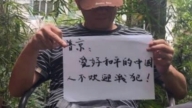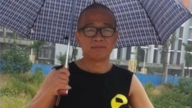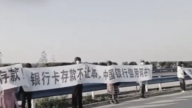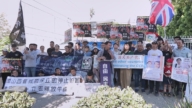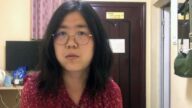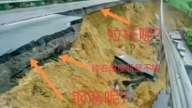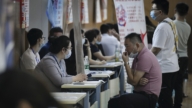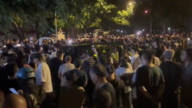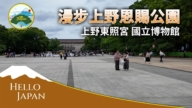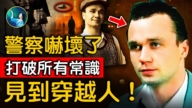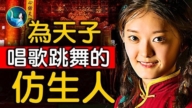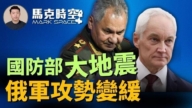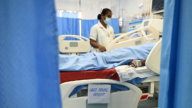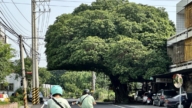【新唐人2011年3月23日讯】福建一所民办大学成千上万师生,上周连续多天罢课静坐,敦促整改学校管理体制。呼吁莫让高校沦为吸金工具。请和本台记者一起去了解师生们抗议的心声。
福建泉州民办高校仰恩大学师生,3月16号起,聚集在行政楼下静坐,抗议创校人家族的基金会干预校务,苛扣教师、压榨学生、罔顾教学、敛财至上等现象,督促教育部门整改学校管理体制。
福建省教育厅一名厅长17号,到场与静坐的师生对话。学生喊出维护师生权益以及成立工会等口号。
老教师:“关键就是咱大学的管理体制不合法!成为资本家赚钱的地方。”
中南财经政法大学教授、廉政研究院院长乔新生表示,由于大陆好多大学和其他科研机构属于事业单位,事业单位体制的弊端易滋生腐败。事业单位法人既可以借助于市场“配置资源”的手段,获取商业利益,又可以“任免权”收受他人贿赂,自行设置岗位,自行安排岗位负责人。
在大学里不仅学院领导掌握大量的行政经费,各个系、教研室的负责人也有行政经费的支配权。这些行政经费既不需要对普通教师公开,也不需要对社会各界公开,完全是暗箱操作。形式多样的高校腐败问题也就时有发生。
老教师:“最根本的是改革体制,从赚钱出发怎么叫高校? ”
上海交通大学编审、21世纪教育研究院副院长熊丙奇指出,在大陆,很多在高校外的人可能根本不知道,申请到科研经费就可以有“专案”提成,一般提成都在10%;和企业合作的专案,提成可以高达40%。如果申请到一个1000万元的科研专案,就可以马上到手100万元,或者是400万元。
某大学校长和一位教授聊天,说某老师,据说你现在身家千万啊。那位教授问,校长,你问的是总收入,还是年收入啊?
而相比之下,福建仰恩大学已有20多年办学历史,教师月薪才一两千元,还被苛扣工资、拒发讲师证等等困扰,原本一千多位老师,如今只剩三百多。众多专业课师资不够,甚至无法开课,教学设施简陋。
学生小陈:“因为你看学生本身就是想在学校学好之类的,主要是设备条件和师资力量这边没有做好。”
2007年吉林大学还爆出“30亿债务风波”事件。有高校一年的接待费相当于中西部一个省的接待费,有高校居然允许报销领导的洗脚费。
实际上,被揭露的学术腐败只是冰山一角,发生在大学围墙内的学术腐败只是整个社会腐败的缩影而已。
熊丙奇认为,这是制度问题。现在的制度,就是把学术当作一个致富的工具了。
乔新生则表示,事业单位的体制改革早已成为社会普遍共识。解决事业单位体制性腐败问题,必须釜底抽薪,真正实行民主管理。
对于仰恩大学抗议事件,3月20日,省教育厅承诺整改后,21日学校才开始复课。
学生小王表示,具体也不知道怎样?大家拭目以待吧!
新唐人记者唐睿、刘慧综合报导。
Universities – Moneymaking Tools?
Thousands of teachers and students in a private
university in Fujian went on a sit-down strike
for a series of days last week,
to urge the education department
to rectify the School’s management system
and to appeal not to let universities
become moneymaking tools.
Let’s hear from the teachers and students on strike.
Since March 16, at the private Yang’en University,
(YU) in Quanzhou City, Fujian Province,
students and teachers gathered in front
of the Administration Building
and went on a sit-down strike. They protested
that the School founder’s family foundation
interferes with School affairs, the School cuts
teachers’ payments, increases students’ fees,
and accumulates money by unfair means.
They urged the education department
to rectify the School’s management system.
On March 17, the director of Education Department
in Fujian Province went to the university
to negotiate with the teachers and students on strike.
The students shouted slogans to protect their rights,
and called for the establishment of a student union.
A senior teacher: “The major problem is that
our School’s management system is illegal,
which makes the university a moneymaking place.”
A professor and director of the Social Development
Research Center at Zhongnan University of
Economics and Law, Qiao Xinsheng,
said that many universities and research institutions
in China are public institutions whose drawbacks
in management system can result in corruption.
A public institution can not only gain
commercial interests through market allocation
of resources, but also take bribes
by arbitrary appointments and dismissals.
In China’s universities,
not only the university officials but also the directors
of every department and teachers’ office can control
large amounts of administrative funds.
The operation of these administrative funds
do not need to be open to teachers or the public.
The entire business is not transparent. Therefore,
corruption happens all the time in universities.
A senior teacher:
“The most important thing is to rectify the system.
How can a university take money as its major goal?”
Xiong Bingqi, Editor of Shanghai Jiao Tong
University, and Assistant Dean
of the Institute for 21st Century Education,
said that in China, many people outside universities
could never know the fact that if someone
successfully applies for research funds,
he can deduct a percentage from it.
Normally, the deduction percentage is around 10%.
For funds from industry projects
the deduction percentage can be up to 40%.
Therefore, if a person gets a research project
worth RMB10 million, he can immediately earn
between RMB1 million and RMB4 million.
A university president talked to a professor:
“Professor, it is said that you earn millions?”
The professor asked: “Do you refer
to my total income or my annual salary?”
Compared to these huge incomes at YU,
an average teacher with 20 years of work experience
can only receive RMB1,000-2,000 per month.
Teachers are also suffering deductions of payments
and cancellation of their licences. There were once
more than 1000 teachers in Yang’en,
but now only 300 remain.
Many specialized course teachers
are poorly paid and teach even without payment.
The teaching facilities are poor too.
A student, Xiao Chen, said: “We students
come to universities only for good education,
but the Schools don’t have up to date facilities.”
In 2007, it was revealed that Jilin University was
RMB3 billion in debt. In addition, there are
some universities whose annual enrolment fee
is equal to that of a whole province in western China.
Some universities even cover the fees
of spa services for officials.
Actually, what has been revealed
is merely scratch on the surface.
The academic corruption happening at universities
is only a miniature of the whole society’s corruption.
Xiong Bingqi believes
that the current political system is the culprit.
It made academic work a tool for making money.
Qiao Xinsheng said, it is already a social consensus
that the management systems of public institutions
need change. In order to eliminate corruption
in public institutions’ systems,
we must adopt democratic forms of management
which is the fundamental solution.
In response to the strike at YU, on March 20,
Fujian Department of Education promised
to rectify School’s management system.
Schools then resumed classes on March 21.
A student, Xiao Wang said, “I cannot predict
what the future will be like. Let’s wait and see!”
NTD reporters Tang Rui and Liu Hui


